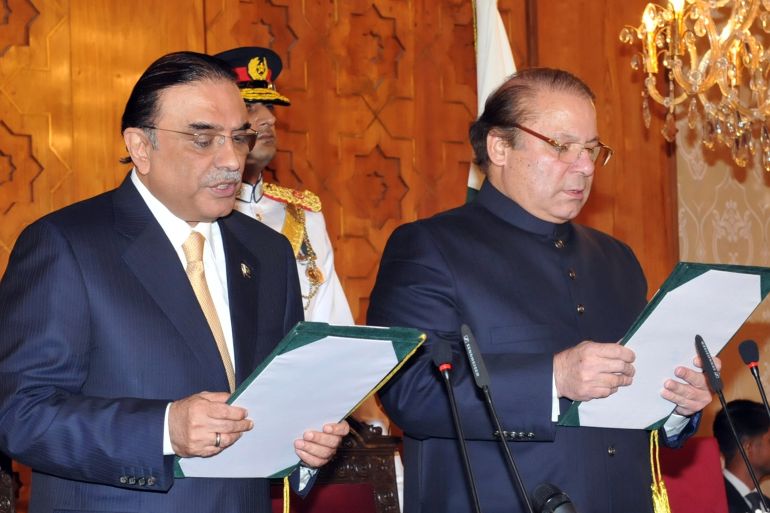Pakistan ex-president charged for corruption, ex-pm with sedition
Asif Ali Zardari charged in two corruption cases, while Punjab government admits case against Nawaz Sharif for treason.

A Pakistani court has formally charged former President Asif Ali Zardari in two corruption cases, while a provincial government has admitted a case of sedition against three-time former Prime Minister Nawaz Sharif and 40 others, including the premier of Pakistan-administered Kashmir.
The cases against these high-profile names come as Zardari’s Pakistan People’s Party (PPP) and Sharif’s Pakistan Muslim League-Nawaz (PML-N) party prepare for a large anti-government rally targeting Prime Minister Imran Khan.
Keep reading
list of 3 itemsPakistan opposition leader arrested in corruption case
Pakistan’s opposition takes blunt aim at country’s military
Sharif’s PML-N is a leading member of the Pakistan Democratic Movement (PDM), launched last month as an alliance of opposition parties aimed at bringing down Khan’s government, which remains largely popular.
The PDM is set to hold its first public protest on October 16 in the central Pakistani city of Gujranwala, the movement announced on Monday.
The corruption cases against Zardari escalate the legal challenges facing the leading opposition member of parliament who served as president of Pakistan from 2008 to 2013, after Pakistan’s former military ruler Pervez Musharraf was forced to resign.
He is the widower of Benazir Bhutto, who served twice as prime minister before she was assassinated in 2007 in an attack that saw her shot at by a gunman who also detonated an explosive vest he was wearing.
Zardari was released on bail on medical grounds last December, six months after his arrest for corruption.
During Monday’s court appearance in the capital, Islamabad, Zardari pleaded not guilty to money laundering and other corruption charges. He later told reporters he was not surprised by the indictment and that he had been facing such charges for as long as he was in the opposition.
He is accused of having dozens of bogus bank accounts, a charge he denies, saying he has been politically victimised by Khan’s government.
Since coming to power, Khan has vowed to make good on his election campaign promise to eliminate corruption. His government says the corruption cases against Zardari began during Sharif’s tenure.
Sedition case against Sharif
Meanwhile, Sharif’s PML-N on Monday said police in Punjab province had initiated a treason case against him and other party leaders, including former Prime Minister Shahid Khaqan Abbasi, and prime minister of Pakistan-administered Kashmir, Raja Farooq Haider.
The sedition case against Sharif, filed by a private citizen in Lahore, is based on speeches made by him and his allies in which they attacked the country’s powerful military for alleged political interference.
Last week, Sharif – speaking from his exile in London – accused Pakistan’s powerful military of rigging the 2018 election that brought Khan to power. Khan dismissed the allegations as baseless, accusing Sharif of “playing India’s game” and criticising the military to benefit the country’s enemies.
Pakistan’s military has directly ruled the country for roughly half of its 73-year history since independence. Since 2018, when Khan was elected in a controversial election, the army has taken an increasingly active role in governance in partnership with the civilian government.
Under Pakistani laws, anyone charged for treason can be sentenced to death if found guilty.
“If [Maryam Nawaz, Sharif’s daughter, and her husband] speak against the military, against the security agencies, against the courts, against democratic institutions, and on top of that, you are already a convict […] should they be saluted, or given a garland of flowers? There will be cases against them,” Punjab’s Information Minister Fayyaz ul Hassan Chohan said during a news conference on Monday.
Chohan, who is a member of the governing Pakistan Tehreek-e-Insaf (PTI) party led by Imran Khan, claimed the Pakistani constitution “says clearly that there will be no criticism against the Pakistani army or security agencies”.
Article 19 of the Pakistani constitution, which deals with freedom of expression, states that such freedom “will be subject to any reasonable restrictions imposed by law in the interest […] security or defence of Pakistan”, among others.
Later on Monday, however, Khan distanced himself from the sedition case, which, under Pakistani law, would require the federal government to lay the charges formally if they are to be pursued.
“The prime minister was unaware of this FIR, and when I brought it to his attention […] he expressed extreme displeasure at it,” Fawad Chaudhry, a senior leader in the ruling PTI and current minister of science and technology, said on Monday.
The 70-year-old Sharif, who served three times as prime minister, was removed in 2017 over corruption allegations. He was released on bail last year for four weeks to seek medical treatment abroad and has been in London since November.
Last month, a court issued arrest warrants for Sharif, who was previously sentenced to seven years in prison on corruption and money laundering charges stemming from disclosures in the Panama Papers.